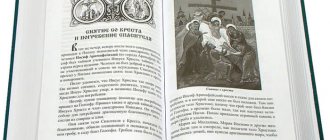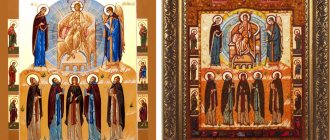"Save me, God!".
Thank you for visiting our website, before you start studying the information, please subscribe to our Orthodox community on Instagram, Lord, Save and Preserve † - https://www.instagram.com/spasi.gospodi/. The community has more than 60,000 subscribers. There are many of us like-minded people and we are growing quickly, we post prayers, sayings of saints, prayer requests, and timely post useful information about holidays and Orthodox events... Subscribe. Guardian Angel to you!
Most Orthodox Christians are sure that meat, as well as fast food, should not be eaten exclusively on days of fasting. However, in reality everything looks more complicated, because in the Old Testament you can find a fairly large list of those foods that are forbidden to be consumed not only during fasting, which also includes pork. But you will learn from our article why Orthodox Christians can eat pork or why it is forbidden.
Why Orthodox Christians Shouldn't Eat Pork
According to the scriptures presented in the Old Testament, eating animals that died a natural death (that is, which were not bled), as well as the meat of God’s creatures that were strangled, is prohibited. In addition, eating blood sausage and similar products that use animal blood are prohibited.
A prohibition of this kind is connected with the Holy Scripture, which says that animals have a soul - the soul of God’s creature is in its blood. Under no circumstances should you eat the soul of an animal along with its flesh. If a believer eats the blood of God’s creatures along with his food, he will acquire the image of the animal whose blood he consumed.
The best article for you, go to: Bible - Genesis
It should be noted that according to the Old Testament, unclean animal flesh mainly refers to:
- crabs, crayfish, and fish that lack scales;
- hares and rabbits;
- a dead animal (that is, without bleeding);
- fried blood of birds and animals;
- horsemeat.
But with all this, unclean meat, such as, for example, pork, is allowed to be consumed in times of hunger or need.
New Testament and the removal of restrictions
Jesus Christ came to earth so that Fr. According to the testimony of the apostles, he himself speaks about this more than once. The new agreement cancels the old agreement that was made by God through Moses. The Lord promises to put a new law of life into the hearts of every person.
“I will put My laws in their minds, write them on their hearts, and I will become their God, and they will become My people.” (Hebrews 8:7-13).
Thus, the old laws are leveled out, and humanity is called to live according to new laws that regulate spiritual life more than physical life. There are no longer any strict restrictions on the consumption of certain foods. Anyone can eat meat, including those animals that were previously prohibited.
First Corinthians 10:25-28 says that any meat that is sold in a meat market is permitted. Restrictions can only be related to not clouding one’s own conscience. That is, in essence, a person is given the right to choose at his own discretion.
In Chapter 15 of the Book of Acts it is written that the Apostolic Council established a ban on eating blood and dead animals that were not slaughtered for food, but “hanged themselves” on their own. Eating this food is placed on a par with fornication and idolatry. Otherwise, newly converted Christians were instructed not to do to others what they would not like to do to themselves.
Thus, the ban on pork was lifted along with other restrictions. New Testament Christians should think less about the purity of the menu and more about the purity of the soul. Love for God and neighbor should be the main goal in life. You can refuse pork so as not to confuse, for example, Muslims and Jews when sharing a meal.
What Scripture Says
However, why do Orthodox Christians eat pork almost as an everyday dish, without any special need? As for this type of meat, it’s also not so simple, because the following words are given in the Holy Scripture about this:
“But a pig, although it has two hooves, does not chew the cud, is unclean to you; You shall not eat their meat and do not touch their corpses” (Bible. Deuteronomy 14:8).
It is important that all existing prohibitions on eating pork are indicated only in the Old Testament, because the main purpose of such a law was considered to be that it was to prepare Orthodox people for the coming of Jesus Christ, the Son of God. Here's what the biblical apostle Paul said about this:
“Therefore the law was our guide to Christ, that we might be justified by faith; But when faith comes, we are no longer under a teacher” (Gal. 3:24,25).
Therefore, with the coming of the Savior, according to the New Testament, the need to adhere to the ritual law simply disappeared, and even more so, if convincing believers to follow it would mean erecting a wall between the pagan peoples and the Holy Scriptures.
Therefore, the Lord sent down a special Revelation explaining this:
“The next day, as they walked and approached the city, Peter, about the sixth hour, went up to the top of the house to pray. And he felt hungry and wanted to eat. While they were preparing, he went into a frenzy and sees the open sky and a certain vessel descending towards it, like a large canvas, tied at the four corners and lowered to the ground; in it were all four-legged creatures of the earth, animals, reptiles and birds of the air. And a voice came to him: Arise, Peter, kill and eat. But Peter said: No, Lord, I have never eaten anything bad or unclean. Then another time a voice came to him: “What God has cleansed, do not consider unclean” (Acts 10:9-15).
It follows from this that any person is free to eat or not eat pork, and this will not in any way affect his relationship with the Almighty.
The best article for you, go to: What does the color of the domes on Orthodox churches mean?
The Lord is always with you!
Pork in the Bible. Law on clean and unclean food
The question of clean and unclean food, which is what you are actually asking about, is being discussed by many Christians today. Here opinion is divided. Most denominations believe that the New Testament abolished the law of Moses, and therefore the commandments about unclean food also became obsolete. However, there are no texts in the New Testament that somehow confirm this. All the verses that are cited as examples by repeal advocates have a completely different meaning in the context of the story. Moreover, there are many texts in the New Testament exalting the law. Read more about this in my book “Returning to the Origins of Christian Doctrine,” in particular, in the chapters “Current Commandments of the Old Testament of the Bible,” “Old Testament and New.” Law of Moses, Scripture" and nearby sections of the book. And a good knowledge of the Law of Moses does not allow us to conclude that it was abolished. All Old Testament Scripture speaks of the immutability of God and His law. Read about this in the chapter “God is unchangeable and His law does not change.”
Indeed, the ministry and sacrificial death of Christ abolished the ritual commandments of the law of Moses (sacrifices, service in the temple), since they were types of Jesus. The commandments relating to the theocratic state of Israel also ceased to apply, since the New Testament involves the spread of faith in God across different countries. Jesus clearly defined the commandments that have lost their meaning - these are the commandments that have already been fulfilled:
Matt. 5:17 “ Do not think that I came to destroy the law or the prophets: I did not come to destroy, but to fulfill
.
18 For verily I say unto you, Until heaven and earth pass away, not one jot or one tittle shall pass from the law, until all is fulfilled
. 19 Therefore, whoever breaks one of the least of these commandments and teaches people so, he will be called the least in the kingdom of heaven; and whoever does and teaches will be called great in the Kingdom of Heaven.”
Onion. 16:17 But it is sooner for heaven and earth to pass away than for one tittle of the law to be lost.
However, all the other commandments that have not yet been fulfilled, including the commandments about unclean food, still remain relevant for all believers.
Moreover, the unclean bird is mentioned in the text of the New Testament, by John in the book of Revelation, which dates back to the end of the 1st century AD. This proves that even at the end of the 1st century, Christians still distinguished between clean and unclean animals.
Rev. 18:2 ...Babylon the great [harlot] is fallen, fallen, and has become a habitation of demons and a refuge for every unclean spirit, a refuge for every UNCLEAN spirit
and the disgusting bird...
It is worth noting that scientists have already proven that many of the animals listed in Leviticus 11 are actually harmful to eat. For example, pork is not given to children in school and kindergarten, and in the instructions for rescue in the event of shipwrecks, written for American naval personnel, it is not recommended to consume those aquatic inhabitants that God forbade in the Bible.
As for Muslims, we should not act like them... On the contrary, judging by the fact that the Koran was written more than 500 years after the last book of the Bible, then most likely Muslims took the commandment about pork from Scripture, like many other rules found reflected in the Holy Book of the Faithful.
There are several texts in the New Testament that proponents of unrestricted eating point to. Jesus once said:
“Nothing that enters a person from without can defile him; but what comes from it defiles a person” (Mark 7:15, Matt. 15:11).
Of course, from this phrase we can conclude that you can put anything into your mouth. However, it is important to understand whether this is the message Jesus wanted to convey to us, or whether He was talking about something else.
At the first reading of this entire story, which was told by the evangelists Mark and Matthew (7 Ev. from Mark, 15 Ev. from Matthew), it is clear that Christ with this phrase carried a completely different message to his listeners. From the context of the story, it is clear that the spiritual teachers of that time, the scribes and Pharisees, complained to Jesus that His disciples “transgressed the tradition of the elders, for they did not wash their hands when they ate bread” (Matt. 15:2, Mark 7:2).
In response to this reproach, Christ denounced his opponents for having abolished God’s direct commandments through the traditions of the elders (see Matt. 15:3-9, Mark 7:6-13). Jesus gave them as an example the commandment about caring for parents (Ex. 20:12), which the elders changed by their tradition so that it lost the meaning that God intended in it. That is, directly violating God's law, the Pharisees, meanwhile, paid a lot of attention to the religious rituals they invented, including washing their hands, washing mugs and cups, and the like (see Mark 7:8).
In the chapter “The Law of Commandments and Doctrine” in my book it is explained that this is not about washing hands for reasons of hygiene, but about the ritual cleansing before meals, which was in effect among the Jews then and still today. Thus, to the reproach of the scribes and Pharisees for not washing their hands, Christ replied that He only did not observe the ritual invented by people, since it was not important for the spiritual life of a person. This is exactly what Jesus explained with the famous phrase:
“Nothing that enters a person from without can defile him; but what comes from it defiles a person” (Mark 7:15, Matt. 15:11).
As we now see, in Jesus' lesson there is no allusion to food, but rather about ritual, spiritual uncleanness, which the Pharisees associated with non-observance of the ritual of hand washing. Jesus explained when a person is spiritually unclean:
Matt. 15:17 “Do you not yet understand that everything that goes into the mouth passes into the belly and is cast out? 18 But what comes from the mouth—comes from the heart—this defiles a person, 19 for out of the heart come evil thoughts, murder, adultery, fornication, theft, false witness, blasphemy—20 these defile a person; but eating with unwashed hands does not defile a person
«.
If we take literally the words of Jesus, “ Nothing
“that which enters a person from the outside cannot defile him,” it turns out that the apostles then began to contradict their Teacher, since at the first council they forbade Christians, according to the law of Moses, to eat “things sacrificed to idols, blood, and strangled things” (Acts 15:29). However, we understand that the Bible cannot contradict itself, that is, the disciples could not contradict the Teacher... Therefore, attributing the words of Christ exclusively to “unwashed hands” is the only possible one, since it corresponds to the context of the story and does not conflict with other texts of the Holy Scriptures .
| READ MORE ABOUT CLEAN AND UNCLEAN FOOD, PAGE. 2 >> |
Valery Tatarkin
Other Commentaries on the Bible (questions and answers)
Continue reading the book “Returning to the Origins of Christian Doctrine”
| Tags: Law, clean, unclean, food, Pork, Bible |











